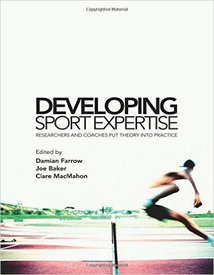 Developing Sport Expertise Edited by Farrow, Baker, and MacMahon Abingdon, Oxon / New York, NY Routledge, 2012 200 pages This text, co-written by a colleague and mentor of mine, Joe Baker, is one of those hidden gems that should be in the library of any professional working with athletes. As the internet is littered with information pertaining to athletic development, it is easy for one to get lost in theoretical practice not founded by research. This particular text does the opposite and gathers the current available literature into a concise, easy to read, resource pertaining to athletic development and firmly grounded in scientific evidence... Table of Contents 1. Introduction: Developing Expertise in Sport – How Research Can Inform Practice Section 1: Developing Elite Athletes: From the Backyard to the Big Stage 2. Play, Practice and Athlete Development 3. Does Practice Make Perfect?: The Role of Training in Developing the Expert Athlete 4. The Motivation to Become an Expert Athlete: How Coaches can Promote Long-Term Commitment 5. Identifying and Developing Sporting Experts Section 2: Designing Practice to Make Athletes Think – (But Not Too Much)! 6. Expert Coaches in Action 7. Skill Learning the Implicit Way: Say No More! 8. Performance Pressure and Paralysis by Analysis: Research and Implications 9. Organising Practice: The Interaction of Repetition and Cognitive Effort for Skill Performance Section 3: Through the Eyes and Thoughts of an Expert 10. A Recipe for Expert Decision Making 11. Tactics: Using Knowledge to Enhance Sport Performance 12. The Sports Official in Research and Practice 13. The Past and Future of Applied Sport Expertise Research Although I had read this book shortly following it's publication in late 2008, I recently re-read it in its entirety due to my increased interest in applied sports science from each of a coaching, strength and conditioning and sport medicine perspective. Reading this book provided me with a deeper insight into how sports experts ACTUALLY develop rather than how we may think they develop. Utilizing the evidence, the editors of this book called upon researchers and coaches from around the world to shed light on the successful and unsuccessful practices employed by scientists, coaches and athletes. Incorporating and comparing both theory and application, topics such as deliberate practice, the developmental model of sport participation (Cote), implicit skill learning, and paralysis by analysis were introduced and expanded upon to provide us (the reader) with a better understanding of how athletes become "sports experts". Overall, I think this is an excellent book for any stakeholder involved in sport including coaches, sports scientists, athletes, policy makers and even sport medicine professionals. And although you may or may not directly work with elite athletes, it never hurts to gain better insight into why Bolt became Bolt and Tiger became Tiger. Note: If this aspect of sports science and coaching interests you, I highly suggest another book titled "Talent Identification and Development in Sport: International Perspectives".
0 Comments
Leave a Reply. |
